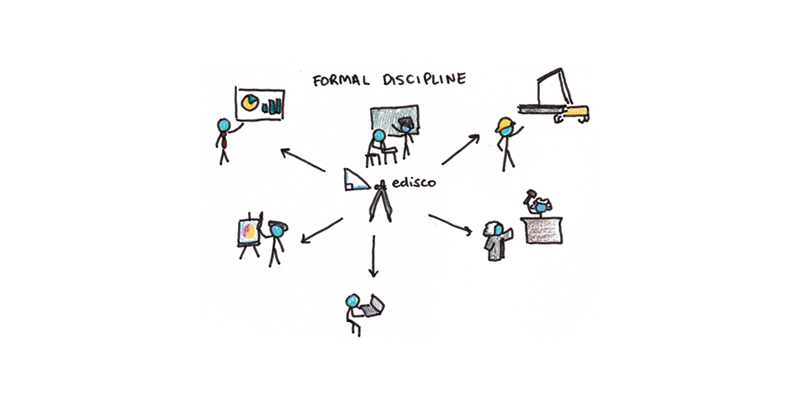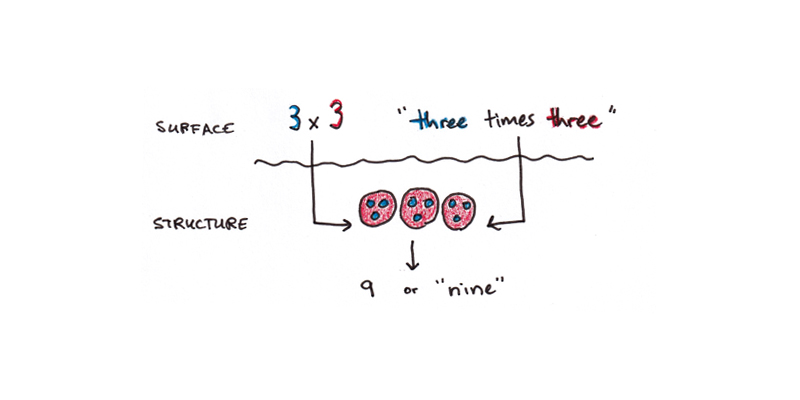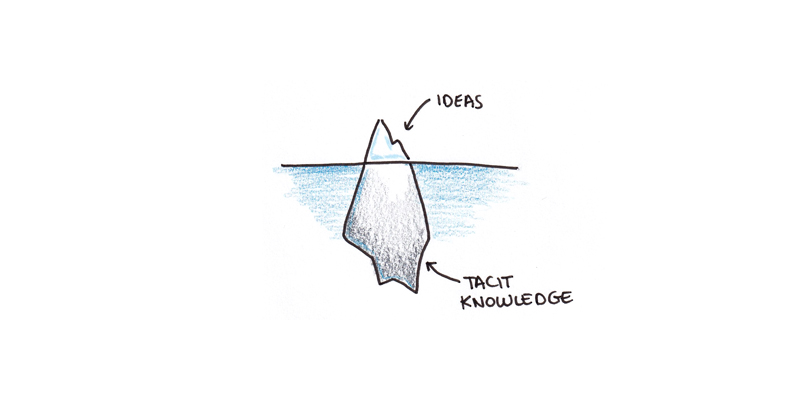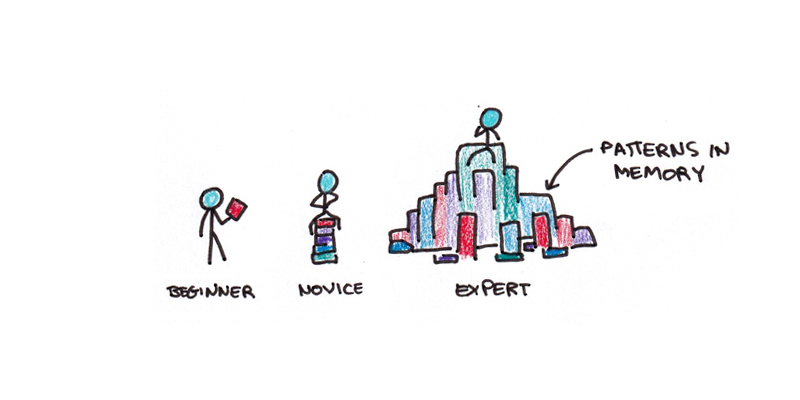How do you build general skills? Abilities that not only help you with a narrow problem, but ones that you can apply repeatedly to problems in your life? Many of our goals, whether its becoming a better programmer, a savvier business leader or more original artist are of this type.
The bad news is that breadth is hard. General skills tend to be built out of many specific ones. Understanding deep ideas can help, but these too often depend on a lot of invisible tacit knowledge to apply correctly.
The good news is that, if you’re prepared to do the work, there’s better ways to learn and study that make breadth more likely.

The Narrowness of Acquired Ability
Earlier theories of the mind suggested it was composed of a handful of separate faculties. Things like reason, language and attention. These, it was assumed, were like muscles—being strengthened by any kind of activity, they would lead to better thinking.
This theory of the mind manifested itself in formal discipline theory. This led to views that learning Latin and geometry were important, even if few students would use these skills in their lives, because by their formal character they acted as the ideal dumbbells for mental strength training.

In 1901, Edward Thorndike showed convincingly that this view was false.1 Training on one task didn’t help much with training on dissimilar tasks. He formulated a view, known as identical elements theory, that suggested that in order for training in one skill to apply to another, the two problems must share common elements. General skills, in other words, don’t exist.
Thorndike’s critique of formal discipline was correct. But his replacement theory wasn’t right either. Identical elements assumed it was the surface characteristics of a task that needed to match. A person hearing a problem they previously saw written, therefore, would be unable to solve it. In taking down a false theory of learning, Thorndike ruled out learning altogether.
What About Ideas?
What Thorndike got wrong was that it had to be only the superficial elements of a task that matched. A number is still a number, whether it’s spoken or written down. Provided a person has the ability to see the correspondence, the problems “three times three” and “3 x 3” are the same, even if they look different.

A more sophisticated argument would then say that problems can transfer to the extent that the mental operations needed to solve them can match. These mental operations are all quite specific, but they can be abstract.
Another way of putting this is that ideas still matter. An idea, as a more abstract, general notion, can influence your thinking on a wider range of problems than a procedure you memorize. Research shows this too, with those being taught the law of large numbers later applying it in different places and contexts.2
Is learning ideas then the road to general skills? This seems to be the reasoning behind programs that teach critical thinking or general problem solving strategies. You might argue my entire work of writing is predicated on this idea, as I’m also hoping to teach general ideas that apply to many cases, rather than just tricks for specific instances.
The Power (and Weakness) of Ideas
Learning ideas can help, but it’s also not a silver bullet. There are a few key hurdles that need to be surmounted if a general idea will be generally useful:
- We need to be able to recognize the idea in different contexts. This can be hard, especially if the contextual cues that ought to trigger the idea are not obvious. Researchers have found that, without hints, people tend not to apply patterns they learn to one problem to analogous ones in different domains.34 Even the research on teaching statistics found that people tend to apply it more readily when the problem domain suggests randomness or probability.5
- We need to be able to modify the idea to suit our current purposes. Knowing an idea, like evolution through natural selection, doesn’t automatically mean we can use it for all purposes. It takes a lot of work to apply it to understanding how technology or culture evolves, for instance.
- We need all the specific skills of implementation. This is another way of saying that ideas are easy and execution is hard. The two differ because to make successful use of an idea requires a mountain of specific skills. Knowing what recursion is and knowing how to apply it to your next programming problem are not the same thing.
Ideas help. Without understanding an idea, learning general skills seems next to impossible. Indeed, the reason many investigations into transfer in schools have turned up so badly may be due to the fact that many students (even good ones) don’t really understand what they’re learning.6
Yet there’s a risk in seeing ideas as an answer, when they’re really only the beginning. The easy-to-spot ideas in a field may really just be the tip of an iceberg of invisible tacit knowledge. Wanting skills that float freely of any specific use, we may end up making ideas that are detached from all uses.

How Do General Skills Get Built?
Despite this, general skills do seem to occur. People develop expertise that allows them to solve wide ranges of problems. How does this happen?
A simple answer is that general skills are constructed out of narrow ones. The chess grandmaster has built an enormous library of patterns in chess, this gives her the ability to reason about board positions she’s never seen before, owing to their similarity to past games.7
In my own book, I documented how Richard Feynman, whose intuitive feats in math and physics were often deemed to be magical by his colleagues, nonetheless is an example of this process. His own description of how he solved difficult problems always pointed back to his extensive library of patterns in math and physics.

There seem to be a few keys, then, to acquiring more broadly useful skills:
- Breadth comes from specificity. All general skills are built from large libraries of more specific knowledge and procedures. There’s no shortcut to expertise.
- Deeply understanding ideas helps. While not a panacea, deeply understanding more abstract ideas extends the useful range of your knowledge. But this only works if you really understand it.
- Visible knowledge is built on invisible skill. The ideas and facts you can easily point to, themselves depend on skills which are often harder to spot. Even the skill of recognizing where an idea applies and modifying it for your purposes are not trivial.
- Practice in a range of real situations. Because much important learning is tacit, learning general skills means facing a large variety of situations that require their use. When learning is confined to a single domain or context, it will be unlikely to leap beyond that in later application.
Ultimately, the generality of the skill you want to learn is itself a question of cost. Sometimes not learning something is okay too, if it helps you get closer to your goals. When learning Chinese, for instance, I decided to learn to recognize characters, but not to handwrite them. To this day, I can’t write from memory, but I’ve read a number of books. It’s often better to begin with specific applications and broaden your skills as you need to, rather than conceive of them in the widest possible terms to start.
This essay is part of a series. To read the first part, go here.
Next week, I’m going to be reopening my course, Rapid Learner, which will offer more ideas and practical suggestions to improve how you learn.
Footnotes
- Thorndike, Edward L., and Robert S. Woodworth. “The influence of improvement in one mental function upon the efficiency of other functions. II. The estimation of magnitudes.” Psychological Review 8, no. 4 (1901): 384.
- Fong, Geoffrey T., David H. Krantz, and Richard E. Nisbett. “The effects of statistical training on thinking about everyday problems.” Cognitive psychology 18, no. 3 (1986): 253-292.
- Gick, Mary L., and Keith J. Holyoak. “Analogical problem solving.” Cognitive psychology 12, no. 3 (1980): 306-355.
- Reed, Stephen K., George W. Ernst, and Ranan Banerji. “The role of analogy in transfer between similar problem states.” Cognitive psychology 6, no. 3 (1974): 436-450.
- Fong, Geoffrey T., David H. Krantz, and Richard E. Nisbett. “The effects of statistical training on thinking about everyday problems.” Cognitive psychology 18, no. 3 (1986): 253-292.
- Gardner, Howard E. The unschooled mind: How children think and how schools should teach. Basic books, 2011.
- De Groot, Adriaan D. Thought and choice in chess. Vol. 4. Walter de Gruyter GmbH & Co KG, 2014.


 I'm a Wall Street Journal bestselling author, podcast host, computer programmer and an avid reader. Since 2006, I've published weekly essays on this website to help people like you learn and think better. My work has been featured in The New York Times, BBC, TEDx, Pocket, Business Insider and more. I don't promise I have all the answers, just a place to start.
I'm a Wall Street Journal bestselling author, podcast host, computer programmer and an avid reader. Since 2006, I've published weekly essays on this website to help people like you learn and think better. My work has been featured in The New York Times, BBC, TEDx, Pocket, Business Insider and more. I don't promise I have all the answers, just a place to start.